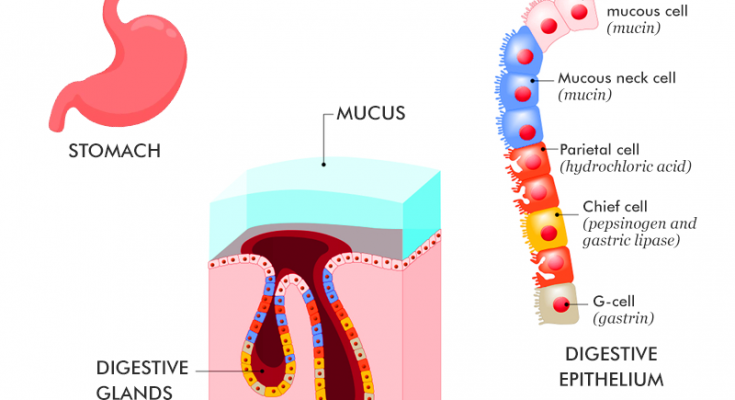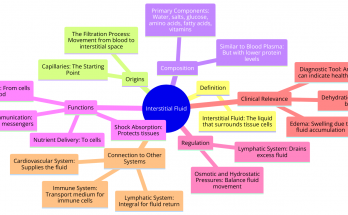Table of Contents
What will happen if Mucus is not Secreted by the Gastric Glands?
Answer – The secretion of mucus by gastric glands is essential for preserving the delicate balance between acid production and protection in the stomach.The absence or insufficient secretion of mucus can have several negative effects on gastrointestinal health. It can result in erosion of the stomach lining, the development of ulcers, and various digestive complications.
In addition to the development of ulcers, individuals may experience chronic acid reflux, gastritis (inflammation of the stomach lining), and an increased risk of infection by harmful bacteria residing in the digestive tract. Mucus plays a critical role in maintaining the integrity of the stomach lining and promoting overall digestive health. By protecting the stomach from its own digestive juices, mucus ensures that the process remains efficient and without unnecessary harm.
The Gastric Glands in the stomach are responsible for maintaining the delicate balance of acid and enzymes necessary for proper digestion. Among the substances released by these glands, mucus plays an important role in protecting the inner lining of the stomach.
Also Check – Gastric Glands – Location , Structure, Types, Secretion and Functions
Secretion of mucus by the gastric glands is essential for maintaining the delicate balance between acid production and protection of the stomach. The absence or inadequate secretion of mucus can lead to erosion of the stomach lining, the development of ulcers and various digestive complications. By protecting the stomach from its own digestive juices, mucus ensures that the digestive process takes place efficiently and without unnecessary damage. Maintaining healthy mucus secretion is crucial for optimal digestive health.
The Protective Role of Mucus
Mucus acts like a natural shield, protecting the stomach’s inner lining from the corrosive effects of hydrochloric acid and pepsin, which are necessary for digestion. Without mucus, these substances can cause severe damage to the stomach wall. Mucus forms a physical barrier that prevents the acid and enzymes from causing damage.
Prevention of Erosion and Ulcers
The absence or inadequate secretion of mucus impairs the ability of the stomach lining to protect itself and makes it susceptible to erosion. Over time, the acidic environment in the stomach gradually erodes the delicate tissue, leading to the formation of painful ulcers.
Impact on Acidity Levels
Insufficient mucus secretion disrupts the balance between acid production and protection. Without an adequate layer of mucus, acid can directly attack the stomach lining, resulting in increased acidity. This acid imbalance can lead to discomfort, heartburn and a burning sensation in the chest and throat.
Digestive Complications
In addition to ulcers, the absence of mucus secretion can lead to chronic acid reflux, gastritis (inflammation of the stomach lining) and an increased risk of infection from harmful bacteria in the digestive tract. Mucus plays a critical role in maintaining the integrity of the stomach lining and the overall health of the digestive system.
- Gastric glands in stomach release Hydrochloric acid enzyme pepsin and mucus
- The mucus protects the inner lining of the stomach from the action of hydrochloric acid and enzyme pepsin.
- If mucus is not released, it will lead to erosion of the inner lining of the stomach, which can cause acidity and ulcer.
- Mucus provides protection against acids and enzymes in stomach.
Similar Questions –
Why is the secretion of mucus by Gastric Glands important?
Answer – The secretion of mucus by Gastric Glands is important because it helps to maintain a delicate balance between acid production and protection in the stomach. Mucus acts as a natural shield, protecting the stomach’s inner lining from the corrosive effects of hydrochloric acid and pepsin, which are necessary for digestion.
What are the negative effects of insufficient mucus secretion by the Gastric Glands?
Answer – Insufficient mucus secretion can have several negative effects on gastrointestinal health. It can lead to erosion of the stomach lining, the development of ulcers and various digestive complications. Without an adequate layer of mucus, the stomach lining becomes susceptible to damage from its own digestive juices.
What are the potential consequences of the absence of mucus secretion in the stomach?
Answer – The absence of mucus secretion in the stomach can result in erosion of the inner lining of the stomach, which can cause increased acidity, discomfort, heartburn and a burning sensation in the chest and throat. It can also lead to the development of painful ulcers and increase the risk of infection from harmful bacteria in the digestive tract.
How does mucus protect the stomach lining?
Answer – Mucus forms a physical barrier that prevents the corrosive effects of hydrochloric acid and pepsin from damaging the stomach wall. It acts as a protective layer, shielding the delicate tissue of the stomach lining from the acidic environment and the digestive enzymes.
What can happen if the stomach lining is not adequately protected by mucus?
Answer – If the stomach lining is not adequately protected by mucus, the acidic environment in the stomach can gradually erode the delicate tissue, leading to the formation of painful ulcers. This can cause discomfort, pain and can also increase the risk of complications such as bleeding and perforation of the stomach wall.
What are some digestive complications that can arise from insufficient mucus secretion?
Answer – Insufficient mucus secretion can lead to chronic acid reflux, which is characterised by the backward flow of stomach acid into the oesophagus, causing a burning sensation in the chest (heartburn). It can also result in gastritis, which is the inflammation of the stomach lining, leading to symptoms such as abdominal pain, nausea and vomiting. Additionally, insufficient mucus secretion can increase the risk of infection by harmful bacteria residing in the digestive tract.
How does the absence of mucus secretion affect acidity levels in the stomach?
Answer – The absence of mucus secretion disrupts the balance between acid production and protection in the stomach. Without an adequate layer of mucus, acid can directly attack the stomach lining, resulting in increased acidity. This acid imbalance can cause discomfort, heartburn and a burning sensation in the chest and throat.
What is the role of mucus in preventing erosion and ulcers in the stomach?
Answer – Mucus plays a crucial role in preventing erosion and ulcers in the stomach. It acts as a barrier between the acidic environment and the delicate tissue of the stomach lining. By forming a protective layer, mucus prevents the corrosive effects of hydrochloric acid and pepsin from damaging the stomach wall, thereby reducing the risk of erosion and the formation of ulcers.
What is the relationship between mucus secretion and acid reflux?
Answer – Mucus secretion helps to prevent acid reflux by providing a protective layer that prevents stomach acid from flowing backward into the oesophagus. When there is insufficient mucus secretion, the barrier that prevents acid reflux becomes compromised, leading to the backward flow of stomach acid and causing symptoms such as heartburn.
How does mucus contribute to maintaining the overall health of the digestive system?
Answer – Mucus plays a critical role in maintaining the overall health of the digestive system. It protects the stomach lining from its own digestive juices, ensuring that the digestive process takes place efficiently and without unnecessary damage. By preventing erosion, ulcers and inflammation, mucus helps to preserve the integrity of the stomach and promotes optimal digestive health.
What substances are released by Gastric Glands in the stomach?
Answer – Gastric Glands in the stomach release several substances, including hydrochloric acid, the enzyme pepsin and mucus. These substances work together to facilitate the process of digestion while protecting the stomach lining from damage.
What are the functions of hydrochloric acid, pepsin and mucus in the stomach?
Answer – Hydrochloric acid helps to break down food particles and activate the enzyme pepsin, which plays a crucial role in the digestion of proteins. However, both hydrochloric acid and pepsin can be harmful to the stomach lining if not properly controlled. Mucus, on the other hand, forms a protective layer that shields the stomach lining from the corrosive effects of acid and enzymes, ensuring that digestion occurs without causing harm.
What happens if mucus is not released in the stomach?
Answer – If mucus is not released in the stomach, the stomach lining becomes vulnerable to damage from hydrochloric acid and pepsin. This can lead to erosion, ulcers, increased acidity levels, digestive complications and an overall decline in gastrointestinal health.
How does mucus provide protection against acids and enzymes in the stomach?
Answer – Mucus provides protection against acids and enzymes in the stomach by forming a physical barrier between the stomach lining and the acidic environment. It acts as a shield, preventing the acid and enzymes from coming into direct contact with the delicate tissue of the stomach lining and thereby minimising the risk of damage and maintaining the integrity of the stomach.
Also Check – What is the role of Acid in our Stomach?
Also Check – 9 Important Function of Stomach in Digestive System
Also Check- Digestive Glands – Definition Types and Functions


5 Comments on “What will happen if Mucus is not Secreted by the Gastric Glands”